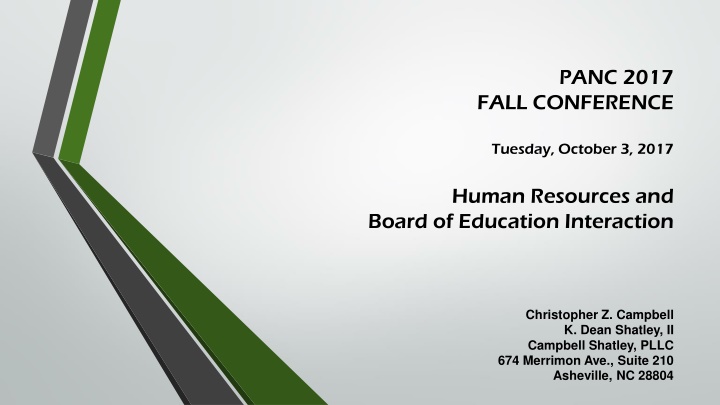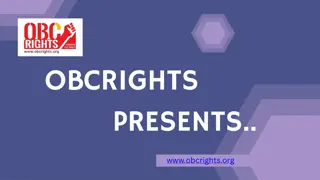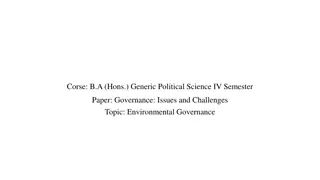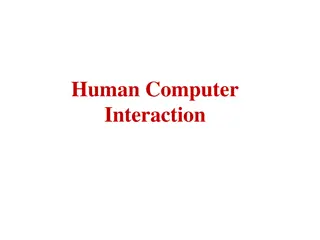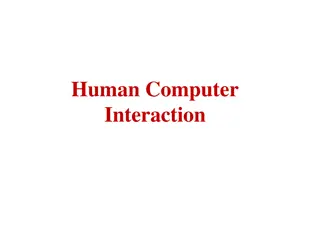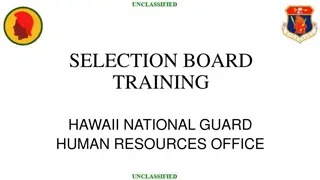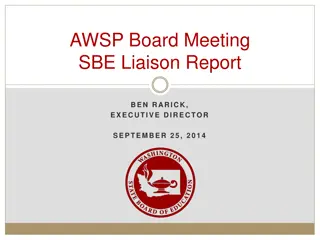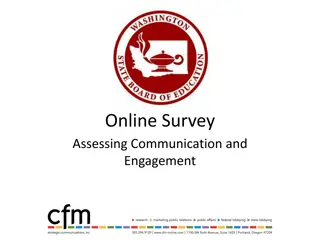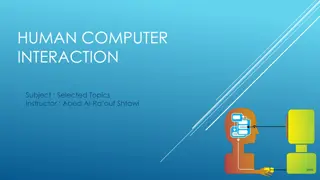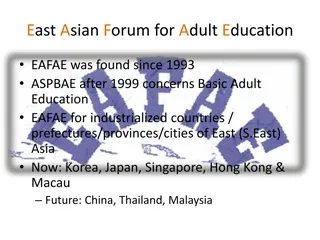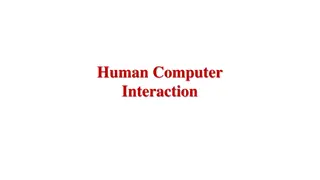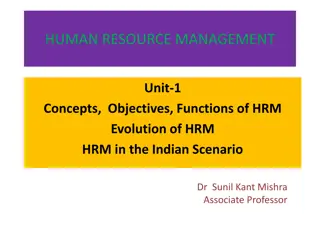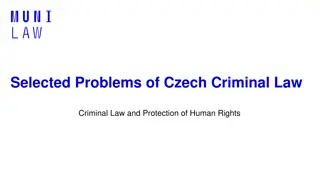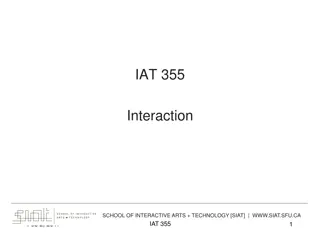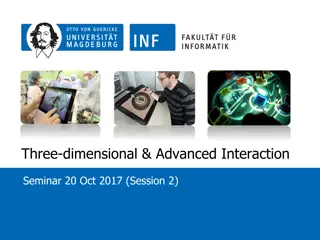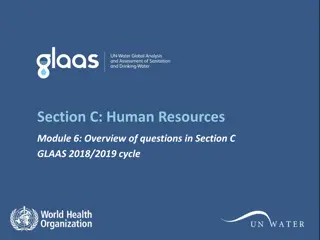Human Resources and Board of Education Interaction
The content discusses the legal framework governing local boards of education as corporate bodies, emphasizing the need for collective decision-making over individual actions. It highlights the duty of the board to act only as a corporate body and not individually, particularly in making hiring and firing decisions. Additionally, it underscores the importance of maintaining impartiality in the exercise of judicial functions to uphold due process rights. The information is presented in a legal context regarding the powers, limitations, and obligations of board members in their official capacity.
Download Presentation

Please find below an Image/Link to download the presentation.
The content on the website is provided AS IS for your information and personal use only. It may not be sold, licensed, or shared on other websites without obtaining consent from the author.If you encounter any issues during the download, it is possible that the publisher has removed the file from their server.
You are allowed to download the files provided on this website for personal or commercial use, subject to the condition that they are used lawfully. All files are the property of their respective owners.
The content on the website is provided AS IS for your information and personal use only. It may not be sold, licensed, or shared on other websites without obtaining consent from the author.
E N D
Presentation Transcript
PANC 2017 FALL CONFERENCE Tuesday, October 3, 2017 Human Resources and Board of Education Interaction Christopher Z. Campbell K. Dean Shatley, II Campbell Shatley, PLLC 674 Merrimon Ave., Suite 210 Asheville, NC 28804
N.C.G.S. 115C-40 provides that a local board is a corporate body. As a corporate body, the Board had no legal existence apart from its members or committees. Further, the Board has no authority to act outside of a regular meetings and members have no authority to act on behalf of the Board unless first authorized to do so. (Some duties cannot be delegated.) CAMPBELL SHATLEY, PLLC ATTORNEYS AT LAW
Duty to Act Only as a Corporate Body, Not Individually Because of its corporate nature, a county board of education can exercise its powers only in a regular or special meeting attended by a quorum of its members, and cannot perform its functions through its members acting individually, informally, and separately. Iredell County Board of Education v. Dickson, 235 N.C. 359 (1952). CAMPBELL SHATLEY, PLLC ATTORNEYS AT LAW
Duty to Act Only as a Corporate Body, Not Individually Unless authority is delegated, board members have no independent authority to act alone. Some duties of the board cannot be delegated at all. Bowles v. Fayetteville Graded Schools, 211 N.C. 36 (1936). CAMPBELL SHATLEY, PLLC ATTORNEYS AT LAW
Duty to Make Hiring and Firing Decisions Local boards of education are authorized to make hiring (and firing) decisions upon the recommendation of the superintendent only. See e.g., N.C. Gen. Stat. 115C- 315(b). Failure to make decisions according to the appropriate procedure and for the appropriate reasons can result in personal liability for board members. See Chadwell v. Lee County School Board, 535 F.Supp. 2d 586 (W.D.Va. 2008). CAMPBELL SHATLEY, PLLC ATTORNEYS AT LAW
Duty to Maintain Impartiality in the Exercise of Judicial Functions The board has a duty to maintain impartiality as a part of its judicial function. The Fourteenth Amendment to the U.S. Constitution guarantees the right to "due process" before a liberty or property interest can be taken away. The right to due process includes the right to a fair hearing before an impartial decision-maker. CAMPBELL SHATLEY, PLLC ATTORNEYS AT LAW
Duty to Maintain Impartiality in the Exercise of Judicial Functions When performing their judicial function during a board hearing and resulting deliberations, board members must act impartially and in a fair manner. Crump v. Board of Education, 93 N.C. App. 168, aff d, 326 N.C. 603 (1990). CAMPBELL SHATLEY, PLLC ATTORNEYS AT LAW
Duty to Maintain Impartiality in the Exercise of Judicial Functions Members must be able to set aside their prior knowledge and preconceptions concerning the matter at issue and base their considerations solely upon the evidence presented at the hearing. Crump v. Board of Education, 93 N.C. App. 168, aff d, 326 N.C. 603 (1990). CAMPBELL SHATLEY, PLLC ATTORNEYS AT LAW
Duty to Maintain Impartiality in the Exercise of Judicial Functions Mere familiarity with facts concerning a charge against a person or prior involvement in the case does not automatically indicate bias, but a fixed decision, made prior to the hearing, to vote in a particular way is impermissible bias. Crump v. Board of Education, 93 N.C. App. 168, aff d, 326 N.C. 603 (1990). CAMPBELL SHATLEY, PLLC ATTORNEYS AT LAW
Duty to Maintain Impartiality in the Exercise of Judicial Functions The bias of a single board member is sufficient to taint the hearing process and deprive an individual of due process. This is true regardless of the impact, if any, of that bias on the board s final decision. Crump v. Board of Education, 93 N.C. App. 168, aff d, 326 N.C. 603 (1990). CAMPBELL SHATLEY, PLLC ATTORNEYS AT LAW
Duty to Maintain Impartiality in the Exercise of Judicial Functions If a board determines that a member is not impartial on a matter that is before the board for hearing, the board may disqualify the member from the hearing. 54 Op. N.C. Att y. Gen. 86 (1985). CAMPBELL SHATLEY, PLLC ATTORNEYS AT LAW
Public Records: Assume everything that "relates" in any way to the school district IS a public record. (e.g. notes, voicemails, letters, e-mails etc.) The most common exceptions are: Purely Personal Records Personal records, including e-mail, that do not have anything to do with the school district or its business are not a public record (i.e. an e-mail to Mom saying Happy Birthday). Student Records Education records of a student or prospective student and personally identifiable information under FERPA are not considered public records. CAMPBELL SHATLEY, PLLC ATTORNEYS AT LAW
Attorney-Client Communication ONLY CERTAIN COMMUNICATIONS FROM THE ATTORNEY ARE EXCLUDED, NOT EMAILS FROM YOU! Legal questions, or requests for legal advice are public records (unless about personnel or another exceptions). Personnel Records Most information on an employee or applicant, gathered by the employer, regarding the employee s performance, evaluation and/or disciplinary action is likely to be a personnel record. This can include records outside of the central office personnel file. CAMPBELL SHATLEY, PLLC ATTORNEYS AT LAW
Trial Preparation Materials In order to be excluded, trial prep material must be prepared in anticipation of legal proceedings and include mental impressions and opinions of the author. Public Security Plans After 9/11, the General Assembly excluded information about government buildings and their security, including school emergency plans. CAMPBELL SHATLEY, PLLC ATTORNEYS AT LAW
Volunteer File Any information that relates to the volunteer's performance, selection, non-selection, disciplinary action, or termination. Other Exceptions: Address Confidentiality Program Information Medical Records Criminal Investigations Trade Secrets of Bidders/Vendors/ Contractors CAMPBELL SHATLEY, PLLC ATTORNEYS AT LAW
Best Practice: If the record does not clearly fall within any of the above exceptions, assume that it will be made available to the public and media upon request. If that makes you nervous, DON T PUT IT IN WRITING! CAMPBELL SHATLEY, PLLC ATTORNEYS AT LAW
CLOSED SESSION MOTION (most frequently used subsections) Chairman: I will entertain a motion for the Board of Education to go into closed session pursuant to G.S. 143-318.11 for the following purposes: (Announce ALL that Apply) CAMPBELL SHATLEY, PLLC ATTORNEYS AT LAW
CLOSED SESSION MOTION (most frequently used subsections) 1. Under subsection (a)(1) to prevent the disclosure of privileged or confidential student information pursuant to 20 U.S.C. 1232g (FERPA) and G.S. 115C-402(e); [includes student discipline and student transfers/releases] 2. Under subsection (a)(1) to prevent the disclosure of privileged or confidential personnel information pursuant to G.S. 115C-319- 321; [includes employee matters] 3. Under subsection (a)(3) to discuss matters protected by the attorney-client privilege; [includes attorney update] CAMPBELL SHATLEY, PLLC ATTORNEYS AT LAW
CLOSED SESSION MOTION (most frequently used subsections) 4. Under subsection (a)(3) to receive advice from the school Board Attorney regarding the following lawsuit(s): [list all lawsuits to be discussed]; 5. Under subsection (a)(5) to discuss the acquisition of real property; 6. Under subsection (a)(5) to discuss the terms of a contract for employment; [includes discussing contract terms for new employees] 7. Under subsection (a)(6) to hear a complaint or grievance, by or against an employee. CAMPBELL SHATLEY, PLLC ATTORNEYS AT LAW
CLOSED SESSION MOTION (most frequently used subsections) Sample motion when closed session involves student issues, personnel issues, and attorney updates: I move that the Board of Education go into closed session pursuant to G.S. 143.318.11 for the following purposes: under subsection (a)(1) to prevent the disclosure of privileged or confidential student information pursuant to 20 U.S.C. 1232g (FERPA) and G.S. 115C- 402(e); under subsection (a)(1) to prevent the disclosure of privileged or confidential personnel information pursuant to G.S. 115C-319-321; and under subsection (a)(3) to discuss matters protected by the attorney-client privilege. CAMPBELL SHATLEY, PLLC ATTORNEYS AT LAW
TOP TEN THINGS EVERY GOOD BOARD CHAIR KNOWS 10. The Chairman makes sure that decisions are made by the Board at official Board meetings. 9. On any item requiring immediate action at a meeting, a motion and second should be received before discussion. 8. The Chairman welcomes folks for public comment and reminds them to be respectful. 7. The Chairman reminds speakers before public comments begins that complaints about individual employees need to be directed to the school administration before the Board will consider accepting public comment on the issue because we have a process to follow. CAMPBELL SHATLEY, PLLC ATTORNEYS AT LAW
TOP TEN THINGS EVERY GOOD BOARD CHAIR KNOWS 6. The Chairman makes sure all other members have spoken before he weighs-in. 5. The Chairman knows what can and cannot be discussed in closed session. 4. When the Chairman speaks to County Commissioners, the media, and others he speaks for the Board and should be clear if his personal views differ from the majority. 3. The Board acts as a group not as individuals. CAMPBELL SHATLEY, PLLC ATTORNEYS AT LAW
TOP TEN THINGS EVERY GOOD BOARD CHAIR KNOWS 2. The Chairman ensures that all personnel matters are referred to the Superintendent for investigation, recommendation or action. 1. The Chairman immediately notifies the Superintendent of any concerns that Board members have to prevent small problems from becoming bigger problems. CAMPBELL SHATLEY, PLLC ATTORNEYS AT LAW
ALLEGATION Reportable Offense? Other Serious Crimes Other Misconduct Consultation w/ Law Enforcement Conduct Initial Investigation Interviews (Suspension with Pay) Allow Law Enforcement to Investigate (Suspension with Pay) OR Superintendent s Investigation Board s Role: Refer Complaints to Superintendent Stay out of it Superintendent Cannot Pre-Flight Decisions Coordinate with Law Enforcement if needed Interview witnesses/collect documents Formal Notice of Charges (drafted by School Attorney) Negotiate Resignation (with involvement of School Attorney) Recommendation for Suspension or Termination (drafted by School Attorney) CAMPBELL SHATLEY, PLLC ATTORNEYS AT LAW
Avoiding Flashpoints Tips for Superintendents and H.R. Professionals on Working with the Board of Education
FLASHPOINTS FOR BOARD MEMBERS 1. Feel they are the last to know about a serious personnel matter. 2. They were not consulted in advance regarding major employee decisions (i.e. Principal transfers and assignments). 3. One or more members are getting involved in personnel actions and want to see the personnel file of a single employee. 4. One or more members do not feel they have enough information to vote on personnel in general or for a specific employee. 5. The Board does not know the salary of various central office employees and/or does not know a central office employee received a discretionary pay increase. CAMPBELL SHATLEY, PLLC ATTORNEYSAT LAW
Tips on Working with the Board of Education
#1 Be Upfront regarding major personnel actions. If the new hire or promotion is not paid strictly from a state salary schedule, inform Board members what the salary will be and the source of funds. Do not delay in disclosing potential personnel problems to the Board via telephone and/or during closed session, including Allegations of Employee Misconduct and/or discipline matters (see #3 below); and Budget constraints and reduction in force issues. Once a personnel action is concluded and/or if the employee does not appeal or resigns the Board can be given full information. Especially important if Board members want to know the outcome. CAMPBELL SHATLEY, PLLC ATTORNEYSAT LAW
#2 Be open to providing the type of information that a majority of the Board members want on the recommended personnel list and disclose family relationships with other employees and Board members to ensure compliance with nepotism policies. CAMPBELL SHATLEY, PLLC ATTORNEYSAT LAW
#3 Be honest in making any recommendation. Provide full and accurate information to the Board regarding pros and significant cons. Do not leave out important information about an employee, unless it involves a due process issue (see #4). CAMPBELL SHATLEY, PLLC ATTORNEYSAT LAW
#4 Work with your attorney and superintendent to determine what will and WILL NOT be shared with the Board in an on-going personnel matter. Remind Board members that they cannot have specific details regarding an employee investigation since they could be asked to hear an appeal or make a final decision. CAMPBELL SHATLEY, PLLC ATTORNEYSAT LAW
#5 Establish a culture that the hiring process is open and fair. Explain the hiring process to new Board members so they can explain it to others in the community: a. Vacancies are posted; b. Candidates to be interviewed are selected by the administration; and c. Superintendent makes a recommendation to the Board. CAMPBELL SHATLEY, PLLC ATTORNEYSAT LAW
#6 Be open about the process of employee improvement and non- renewal or termination. a. What are the policies, procedures and practices of the district in assisting employees with performance issues? b. What are the types of documentation necessary for dismissal or non-renewal of an employee? CAMPBELL SHATLEY, PLLC ATTORNEYSAT LAW
#7 Provide all board members with the same information. a. Especially with large requests of information. b. Ensure that a majority of the Board wants to spend time on large information requests. c. If a Board member wants to see a personnel file, we recommend that the Chair and Board Attorney be notified for further discussions. CAMPBELL SHATLEY, PLLC ATTORNEYSAT LAW
#8 Let the Superintendent or Chair take the lead in addressing conflicts with Board members. CAMPBELL SHATLEY, PLLC ATTORNEYSAT LAW
#9 Read your policies before making final administrative decisions and recommendations. CAMPBELL SHATLEY, PLLC ATTORNEYSAT LAW
#10 Ensure principals and other supervisors understand the Boards expectations in how we handle personnel issues (i.e. read your policies and win the head / win the heart). CAMPBELL SHATLEY, PLLC ATTORNEYSAT LAW
Employee Due Process Rights and Involuntary Resignations:
Section 1983 Procedural Due Process Claim Constitutionally protected liberty or property interest Deprived through State Action CAMPBELL SHATLEY, PLLC ATTORNEYSAT LAW
Section 1983 Property interest = contract of employment with termination for cause (Leardini) Liberty interest = reputation in profession (See Ridpath v. Bd. of Governors, 447 F.3d 292 (4th Cir. 2006)) Resignations must be voluntary If voluntary , no deprivation. (See Stone v. Univ. of Maryland Med. Sys., 855 F.2d 167, 173 (4th Cir. 1988). CAMPBELL SHATLEY, PLLC ATTORNEYSAT LAW
Involuntary Resignations Can Be Proven Using Two Theories. First = obtained by employer s material misrepresentation or deception, or Second = forced by employer s duress or coercion CAMPBELL SHATLEY, PLLC ATTORNEYSAT LAW
Material Misrepresentation Means that a False Statement Concerns Either 1) the consequences of the resignation E.g. You will lose your retirement if fired (See Brookshire v. Buncombe County, 2012 WL 136899 (WDNC)) 2) the alternative to the resignation E.g. Quit or be fired. (But see Wolford v. Angelone, 38 F.Supp.2d 452 (W.D. Va., 1999) (holding that an incomplete statement on discharge did not amount to a material misrepresentation)) NOTE: Reliance must be reasonable under the circumstances CAMPBELL SHATLEY, PLLC ATTORNEYSAT LAW
DURESS OR COERCION Duress means that the totality of the circumstances demonstrate that the employer s conduct took away the employee s free choice to resign. CAMPBELL SHATLEY, PLLC ATTORNEYSAT LAW
Factors to Consider in Analyzing Possible Duress: (1) whether the employee was given some alternative to resignation; (2) whether the employee understood the nature of the choice he was given; (3) whether the employee was given a reasonable time in which to choose; and (4) whether he was permitted to select the effective date of resignation . Stone at 174. CAMPBELL SHATLEY, PLLC ATTORNEYSAT LAW
What about COMMON SENSE? The mere unpleasant choice of resign or face legal or disciplinary action , does not establish a due process violation. Stone at 174. CAMPBELL SHATLEY, PLLC ATTORNEYSAT LAW
INVESTIGATION BEST PRACTICES 10. If serious allegations are made against an employee use suspension with pay to allow time to investigate. 9. Meet with the employee as soon as you know the facts to get their side of the story. Sometimes this requires multiple meetings with the employee. 8. Do not bring up resignation at the initial meeting or during fact- finding meetings with the employee. Let the employee ask about resignation. 7. Do not offer opinions regarding the outcome of the investigation. CAMPBELL SHATLEY, PLLC ATTORNEYSAT LAW
INVESTIGATION BEST PRACTICES 6. Do not make promises or offers to entice an employee to resign unless it is part of a written resignation agreement (see #3 below). 5. If the employee insists on resigning, do NOT offer favorable terms such as positive reference, removal of documents from the personnel file, no further action, etc. In other words, allow the employee to resign without making any promises. 4. Encourage the employee who wants to resign immediately to take time to consider their decision and to contact an attorney. If they decline, put that fact in writing for their signature and make no other promises or deals! CAMPBELL SHATLEY, PLLC ATTORNEYSAT LAW
INVESTIGATION BEST PRACTICES 3. If the employee wants to negotiate their resignation, involve your school board attorney to get the terms of the resignation or employment separation in writing. 2. Always involve a witness who can support what happened in the meeting and write-up your meeting notes immediately after the meeting. 1. Don t be in a hurry to get a resignation! If there is good reason for them to resign. . . they will. CAMPBELL SHATLEY, PLLC ATTORNEYSAT LAW
Christopher Z. Campbell K. Dean Shatley, II Campbell Shatley, PLLC 674 Merrimon Ave., Suite 210 Asheville, NC 28804 (828) 398-2775
